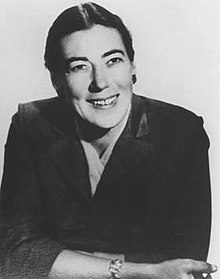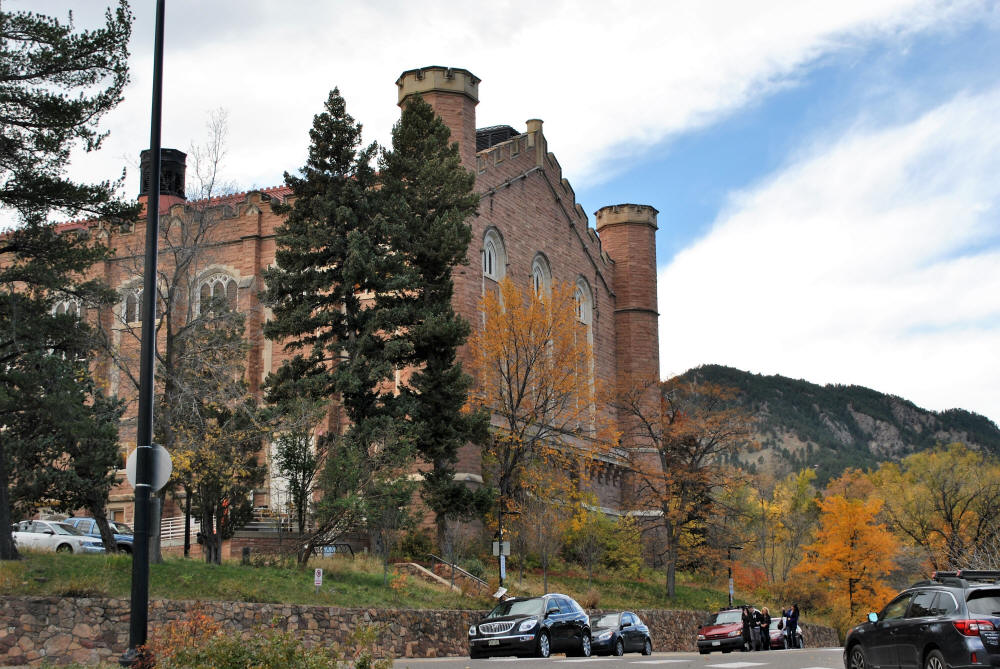Queer Places:
University of Colorado Boulder, Boulder, Colorado 80309, Stati Uniti
Johns Hopkins University, Baltimore, MD 21218, Stati Uniti
400 S Saltair Ave, Los Angeles, CA 90049, USA
Woodlawn Memorial Cemetery, 1847 14th St, Santa Monica, CA 90404, Stati Uniti
 Evelyn
Hooker (née Gentry, September 2, 1907 – November 18, 1996) was an American
psychologist most notable for her 1957 paper "The Adjustment of the Male Overt
Homosexual" in which she administered several psychological tests to groups of
self-identified male homosexuals and heterosexuals and asked experts to
identify the homosexuals and rate their mental health. The experiment, which
other researchers subsequently repeated, argues that homosexuality is not a
mental disorder, as there was no detectable difference between homosexual and
heterosexual men in terms of mental adjustment.
Evelyn
Hooker (née Gentry, September 2, 1907 – November 18, 1996) was an American
psychologist most notable for her 1957 paper "The Adjustment of the Male Overt
Homosexual" in which she administered several psychological tests to groups of
self-identified male homosexuals and heterosexuals and asked experts to
identify the homosexuals and rate their mental health. The experiment, which
other researchers subsequently repeated, argues that homosexuality is not a
mental disorder, as there was no detectable difference between homosexual and
heterosexual men in terms of mental adjustment.
Her work argued that a false correlation between homosexuality and mental
illness had formed the basis of classifying homosexuality as a mental disorder
by studying only a sample group that contained homosexual men with a history
of treatment for mental illness. This is of critical importance in refuting
the existence of the category of cultural heterosexism because it argues that
homosexuality is not developmentally inferior to heterosexuality. Her
demonstration that it is not an illness led the way to the eventual removal of
homosexuality from the American Psychiatric Association's Diagnostic and
Statistical Manual of Mental Disorders.[1]
In the 1940s, she first became interested in what would turn out to be her
life's work. Evelyn was teaching an introductory psychology class in 1944 when
a student approached her after class. He identified himself as Sam From; he
confided in her that he was gay and so were most of his friends.[5]
She realized Sam was one of the brightest students in the class and quickly
became friends with him. They would spend time between and after classes to
talk and get to know each other. Sam introduced Evelyn to his circle of
homosexual friends. They would go to clubs, bars, and parties where Evelyn was
able to fraternize with more homosexuals.[5]
Sam's closest friends were some of the most intelligent students Evelyn had
the pleasure to meet, including
Christopher Isherwood and
Stephen Spender,
a writer and a poet.[3]
He challenged her to scientifically study "people like him".[2]

University of Colorado, Boulder, CO
Sam proposed a question to Evelyn: Why not conduct research on homosexuals
to determine whether homosexuality was some sort of disease or disorder and
not relevant to a person's psychological makeup?[4]
Sam urged her to conduct research on homosexuals, saying it was "her
scientific duty to study people like us".[3]
Evelyn was intrigued by the question and further persuaded by her experience
with social rejection as a child, witnessing the effects of racial and
political persecution in her travels, and discrimination in her professional
life.
Over the next two decades she became established professionally. In 1948
she moved to a guest cottage at the Salter Avenue home of Edward Hooker,
professor of English at UCLA and poetry scholar. They married in London in
1951, and she took his surname. In the mid-fifties Christopher Isherwood
became their neighbor. She was against the relationship of Christopher
Isherwood with the much younger
Don Bachardy; they were
not welcome at her house[8]
Sam From died in a car accident in 1956, just before Hooker's ground-breaking
research was published. Hooker's husband died in January 1957 of cardiac
arrest.[2]
The 1960s saw her work find a wider audience, and her conclusions were
taken up by the gay rights movement. In 1961 Hooker was invited to lecture in
Europe and in 1967, the director of the National Institute of Mental Health
(NIMH) asked her to produce a report on what the institution should do about
homosexual men. Richard Nixon's election in 1969 delayed the publication of
the report, which was published by a magazine, without authorization, in 1970.
The report recommended the decriminalization of homosexuality and the
provision of similar rights to both homosexual and heterosexual people. The
burgeoning gay rights movement seized on this.[2]
She retired from her research at UCLA in 1970 at the age of 63 and started
a private practice in Santa Monica. Most of her clients were gay men and
lesbians.[2]
In her later life she would be awarded with the Distinguished Contribution in
the Public Interest Award.[5]
The University of Chicago opened the Evelyn Hooker Center for Gay and Lesbian
Studies in her honor. She was also the subject of the 1992 Academy
Award–nominated film Changing Our Minds: The Story of Dr. Evelyn Hooker.[5]
Hooker died at her home in Santa Monica, California, in 1996, at the age of
89.[1]
My published books:


BACK TO HOME PAGE

https://en.wikipedia.org/wiki/Evelyn_Hooker
 Evelyn
Hooker (née Gentry, September 2, 1907 – November 18, 1996) was an American
psychologist most notable for her 1957 paper "The Adjustment of the Male Overt
Homosexual" in which she administered several psychological tests to groups of
self-identified male homosexuals and heterosexuals and asked experts to
identify the homosexuals and rate their mental health. The experiment, which
other researchers subsequently repeated, argues that homosexuality is not a
mental disorder, as there was no detectable difference between homosexual and
heterosexual men in terms of mental adjustment.
Evelyn
Hooker (née Gentry, September 2, 1907 – November 18, 1996) was an American
psychologist most notable for her 1957 paper "The Adjustment of the Male Overt
Homosexual" in which she administered several psychological tests to groups of
self-identified male homosexuals and heterosexuals and asked experts to
identify the homosexuals and rate their mental health. The experiment, which
other researchers subsequently repeated, argues that homosexuality is not a
mental disorder, as there was no detectable difference between homosexual and
heterosexual men in terms of mental adjustment. 

